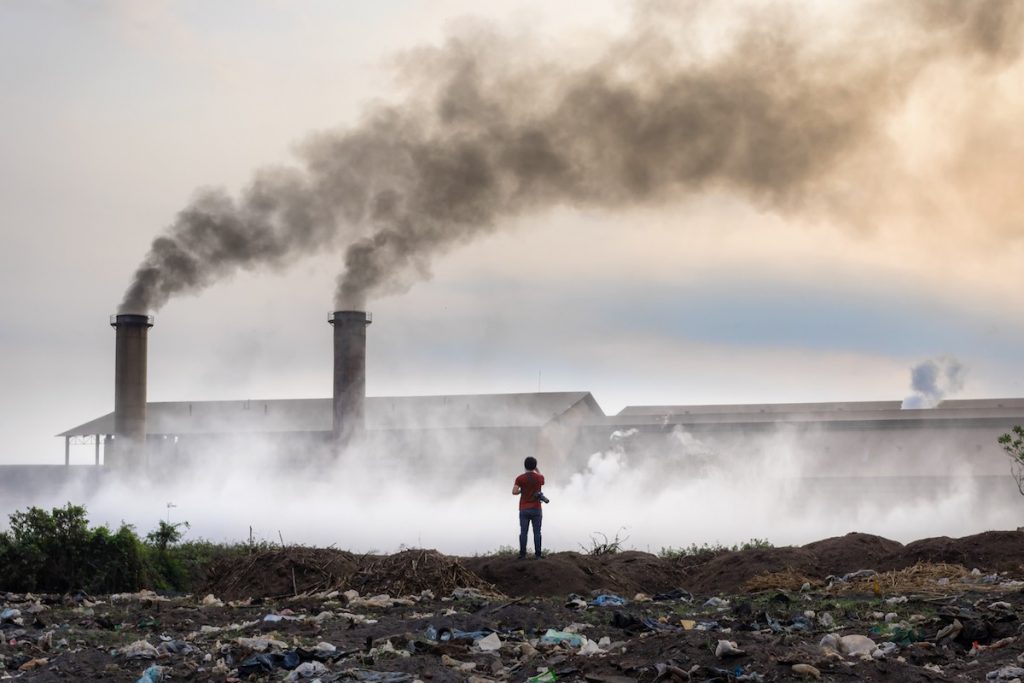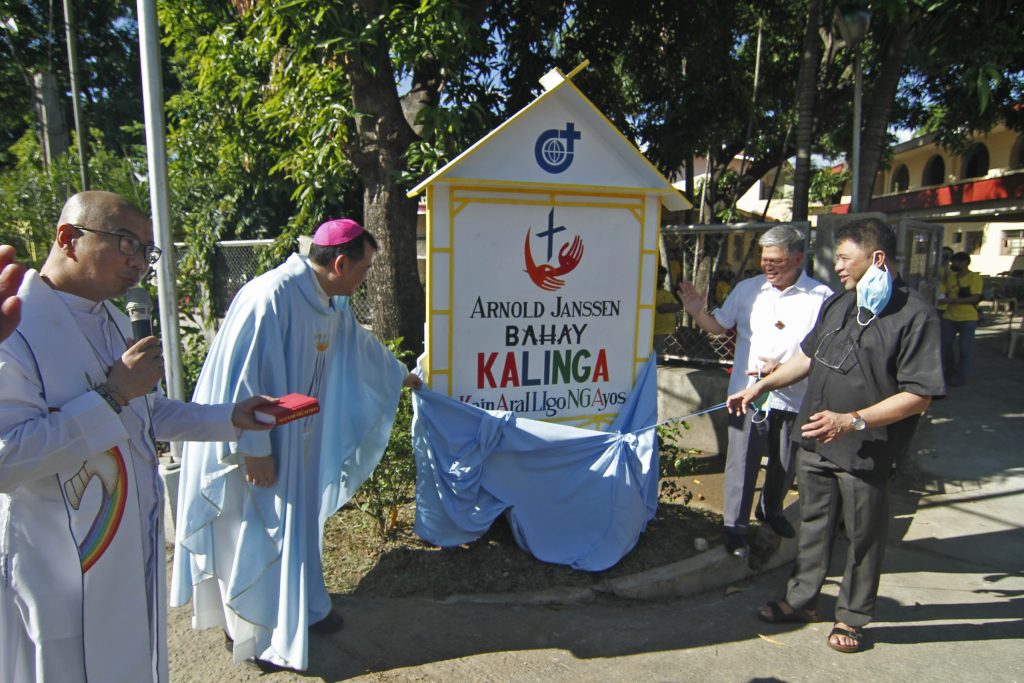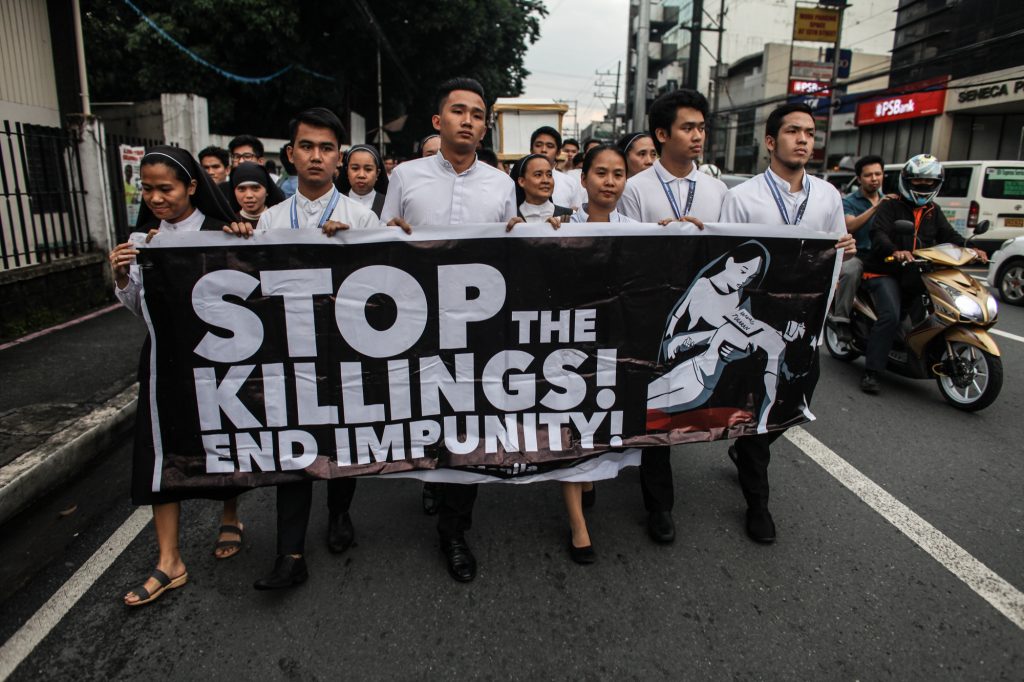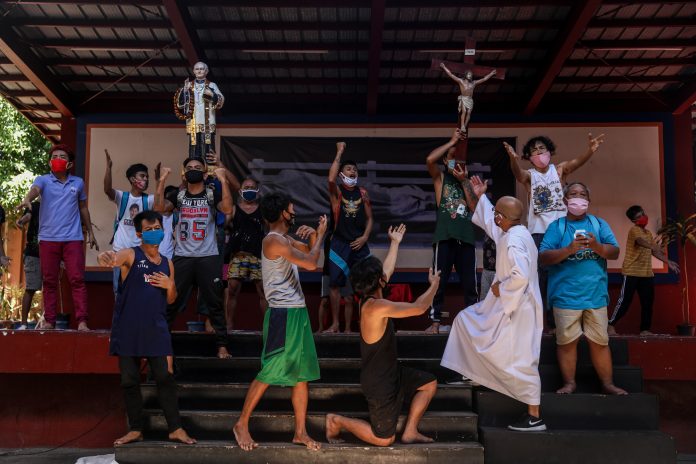Why should we work for justice, peace and integrity of creation? Is this really an integral dimension of our being Christian and being religious? What follows is a preliminary attempt to respond to this question from a theological and ecclesiological perspective. We will also look at this from the perspective of religious life.
Biblico-Theological Perspective
According to the book of Genesis, God is the source and creator of everything. Human beings – men and women – are created in the image and likeness of God. From this flows the equal dignity of all and their inalienable rights.
This is also the basis of the social and relational nature of human beings. All creation – especially human beings –reflects God’s Trinitarian nature as communion. We are all interconnected. Unity in diversity. We are called to live in friendship and loving communion with God, with our fellow human beings and with creation. We have the obligation to care for others. In Laudato Si, Pope Francis affirms the Trinitarian basis for universal communion:
“The human person grows more, matures more and is sanctified more to the extent that he or she enters into relationship, going out from themselves to live in communion with God, with others and with all creatures. In this way, they make their own that Trinitarian dynamism which God imprinted in them when they were created. Everything is interconnected, and this invites us to develop a spirituality of that global solidarity which flows from the mystery of the Trinity” (LS 240)
Since God is the creator of all things, then God is the owner of everything. This is the basis for the universal destination of all goods. This means that no one can claim absolute ownership of anything. Everything that God created (the natural resources, the bounty of nature, the earth, the seas, the rivers, the forest, the air, etc.) is meant for the good of all and for all generations to come.
Human beings – endowed with intelligence and free will – share in God’s creative nature. We are called to be co-creators in our own way. As stewards of God’s creation, we are also called to care for the earth – our common home – to nurture and develop it as well as preserve its integrity. We are called to live in harmony with nature and with all living creatures. Thus, this is God’s will for all: universal communion. Pope Francis in Laudato Si affirms this and shows the consequences when this is not followed:
“Human life is grounded in three fundamental and closely intertwined relationships: with God, with our neighbor and with the earth itself… These three vital relationships have been broken, both outwardly and within us. This rupture is sin. The harmony between the Creator, humanity and creation as a whole was disrupted by our presuming to take the place of God and refusing to acknowledge our creaturely limitations. This in turn distorted the mandate to “have dominion” over the earth. As a result, the originally harmonious relationship between human beings and nature became conflictual (cf. Gen 3:17-19)… Sin is manifest in all its destructive power in wars, the various forms of violence and abuse, the abandonment of the most vulnerable and attacks of nature. (LS 66)”

Thus, sin is the rupture of communion. It is the curvature of the self upon self instead of living in love with God, others and creation. This results in alienation from God, from others and from creation. Instead of being in communion with God there is turning away from God and the worship of idols – the idolatry of wealth and power, and even making oneself or another human being as god. Instead of loving communion with others there is separation, division and enmity. The other becomes a stranger, an enemy, an object of exploitation and destruction. One becomes blind and deaf to the suffering and cry of others. Instead of recognizing God as creator and owner of all things and acting as stewards there is the claim of absolute ownership, the drive to monopolize the wealth and resources of the earth, depriving others of their share of these resources. Thus, what results is inequality, injustice and violence. This also leads to the disregard for nature and destruction of our common home. Injustice, violence and the ecological destruction is therefore the manifestation of sin which is the rupture of communion and the failure to love.
The commandments given to Moses were meant to express love for God and for one another. The violation of these commandments are linked to idolatry, violence, immorality, injustice and oppression. This what the prophets in the Old Testament denounced. These are manifestations of sin and evil which is present within each one and in society. The prophets called for conversion. They also announced the coming of the reign of God, a new world liberated from the reign of sin and evil, where justice and peace prevail, where all will live in harmony and communion with God, with one another and with creation. This was the messianic mission that Christ came to fulfill through his incarnation, death and resurrection. The reign of God, the total victory over sin and evil, the fullness of universal communion will find its completion in the end time – the Parousia. This is what salvation is all about. Meanwhile, this mission is continued by Christ’s community of disciples, the Church, that waits in hope for Christ’s coming in glory.
Ecclesiological Perspective
The Church, according to Vatican II, is Communion and People of God that participate in Christ’s messianic mission. This is emphasized in Lumen Gentium – the Dogmatic Constitution on the Church. All those who comprise the Church are called in live in communion with God and with one another – at the local and the universal level. This communion is also to be experienced in the family and among families. As community of faith, hope and love there is equality in dignity and unity in diversity in the Church. The clergy are at not above the lay-faithful but are at their service and have equal dignity with them although they may have different roles.
Ecclesial communion reflects Trinitarian communion. The Church is the people made one by the unity of the Father, Son and the Holy Spirit. The Church is the sacrament of universal communion – the union between God and humanity – and this communion is ultimate goal of the Church’s mission.

By virtue of their baptism, all are called to actively participate in the three-fold mission: the priestly, prophetic and kingly/servant mission.
- The priestly mission includes active participation in the liturgy and a life of holiness and self-sacrifice.
- The prophetic mission involves proclaiming the Good News and witnessing. It is a mission of evangelization. It includes denouncing all manifestation of sin and evil – selfishness, idolatry, injustice, violence, oppression, inequality, violation of human rights, environmental destruction, etc. It also means announcing the message of salvation and liberation, of justice and peace. This includes the call to conversion and social transformation.
- The kingly/servant mission involves the struggle against sin and evil within oneself and in society. The mission of service includes action for justice, peace and integrity of creation. This means working social transformation and the realization of the reign of God in our midst.
The Mission of the Church as prophet and as Servant provide the basis for the Church’s involvement in the temporal affairs – social, economic, political, cultural. This is highlighted on in Gaudium et Spes. The social teachings of the Church are the concrete manifestation of the Church’s prophetic and servant mission. The Church’s role cannot be relegated in the private sphere. The Church has an active role in the building of a better world. She cannot remain in the sidelines.
The Church is called to be the Church of the Poor and the Church for the Poor. It is the Church that embraces evangelical poverty, whose members follow the example of Christ by making an option for the poor and living a simple lifestyle. It is the Church that hears the cry of the poor, where the poor are welcomed and given priority, where the poor are not just beneficiaries but active participants in the work for justice, peace, liberation and integral development.

The Role of Religious
We cannot find explicit statements on the involvement of religious in the promotion of justice, peace and integrity of creation in the Vatican II documents. Unlike the previous chapters in Lumen Gentium (2-5), there is no explicit reference in Chapter 6 (On Religious) to the three-fold priestly, prophetic and kingly/servant mission although there is an affirmation that religious life is meant to be a sign of Christ in the world and that in the life of religious various aspects of Christ’s life is seen or replicated – Christ in prayer and contemplation in the mountain, Christ proclaiming the coming of the kingdom of God, Christ healing the sick and feeding the hungry multitude. In a separate document on the adaptation and renewal of religious life – Perfectae Caritatis — there is a section (15) that highlights communion in community but there is no explicit reference to religious participating in Christ’s prophetic, priestly and kingly/servant mission. However, one of the principles of renewal laid down in the decree is “sharing in the life of the Church adopting and implementing the Church’s undertaking – biblical, dogmatic, pastoral, ecumenical, missionary and social.”
Although there are religious orders that have not explicitly adopted the framework of three-fold mission to describe their life and mission, in reality many religious communities strive to live as prophetic communities that carry out Christ’s and the Church’s prophetic mission (evangelization, catechesis, denunciation), praying/ worshipping communities (priestly) and servant communities (kingly) dedicated to works of charity, justice, peace, etc. The charisms of various institutes of consecrated life emphasize one of the three-fold missions but do not exclude others. During the post-conciliar period, religious orders implemented the decree on the renewal of religious life. The revised constitutions of the religious orders reflect the vision and orientation of Vatican II while remaining faithful to their charism. Many adopted the ecclesiological framework promoted by the council and have integrated the promotion of justice, peace and integrity of creation in their post-conciliar documents.
In his apostolic exhortation Redemptionis Donum, St. John Paul II explicitly affirmed the participation of religious in the Church’s three-fold mission:
“Your vocation, dear brothers and sisters, has led you to religious profession, whereby you have been consecrated to God through the ministry of the Church, and have been at the same time incorporated into your religious family. Hence, the Church thinks of you, above all, as persons who are consecrated: consecrated to God in Jesus Christ as His exclusive possession. This consecration determines your place in the vast community of the Church, the People of God. And at the same time this consecration introduces into the universal mission of this people a special source of spiritual and supernatural energy: a particular style of life, witness and apostolate, in fidelity to the mission of your institute and to its identity and spiritual heritage. The universal mission of the People of God is rooted in the messianic mission of Christ Himself-Prophet, Priest and King- a mission in which all share in different ways. The form of sharing proper to “consecrated” persons corresponds to your manner of being rooted in Christ. The depth and power of this being rooted in Christ is decided precisely by religious profession.” (RD 7)

This text affirms that religious institutes and communities are located within the vast community of the Church which is the People of God through their consecration. They also in their own way take part in the universal mission of the People of God that share in Christ’s messianic mission as prophet, king and priest. Thus, they can rightly be called prophetic, priestly and kingly/servant communities. Communion and participation in mission that characterizes religious life therefore should be understood in this way. This can prevent a one-dimensional view of religious life. Religious life is not just a matter of living the evangelical counsels of chastity, poverty and obedience. It is also a life lived in communion with God, with the universal and local Church and with one another in community. In Vita Consecrata John Paul II affirms that communion that is lived in religious life leads to mission:
“The life of communion in fact becomes a sign for all the world and a compelling force that leads people to faith in Christ … In this way communion leads to mission, and itself becomes mission; indeed, communion begets communion: in essence it is a communion that is missionary. (VC 46)”
Thus, religious life is also a sharing in the Church’s three-fold mission according to the institute’s charism. Religious communities are prophetic, evangelizing and witnessing communities. At the same time, they are praying, worshipping, celebrating communities. Their life of contemplation and prayer moves them to loving service in whatever form it may take – acts of charity, works of mercy, action for justice, peace and integrity of creation. All these dimensions must be present in religious life. It is a matter of emphasis and specialization according to an institute’s charism. There is, however, a challenge on how these can be concretely be expressed in changing situations.
Through the centuries, religious have exercised a prophetic role within the Church through not just by being at the forefront of evangelization, Christian education but also by their witness of life and by acting as conscience in the Church and society. St. Francis – the poor man of Assisi – is an exemplar especially at a time when the Church – identified with the hierarchy – was regarded as a powerful and wealthy institution. In the age of colonial expansion, religious missionaries who accompanied the conquistadores acted as conscience as they denounced their abuses and even questioned the right to colonize and subjugate these lands. Foremost among these were Bartolome de Las Casas and Francisco de la Victoria. Colonization was not really a matter of the sword and the cross acting together – in many instances it was also the sword versus the cross. However, there was no explicit mention of the prophetic mission in the ecclesiastical documents or constitutions of the religious orders. Even in the Vatican II documents this is absent.
In the post-conciliar period, the explicit association of the prophetic mission and the religious life appeared. The Sacred Congregation for Religious and Secular Institutes affirms this in the document “Human Promotion and Religious Life”: Evangelization, for the Church, means bringing the Good News into all strata of humanity and through it transforming humanity itself from within: its criteria of discernment, its determinant values, its sources of inspiration, its designs for living, opening them up to a total vision of humanity. To accomplish this mission, the Church must search out the signs of the times and interpret them in the light of the Gospel, thus responding to persistent human questions. Religious are called to give singular witness to this prophetic dimension. The continuous religious present to their contemporaries in such a way as to remind everyone that the building of the secular city must be founded on the Lord and have him as its goal.”
This document associates the work of evangelization with the prophetic dimension which religious are to participate by bringing the Good News and become living witnesses of the gospel. This also involves reading and interpreting the signs of the times.
In Vita Consecrata, St. John Paul II affirms the view of community life as well the evangelical counsels in terms of prophetic witness:
“In our world, where it often seems that the signs of God’s presence have been lost from sight, a convincing prophetic witness on the part of consecrated persons is increasingly necessary. In the first place this should entail the affirmation of the primacy of God and of eternal life as evidenced in the following and imitation of the chaste, poor and obedient Christ, who was completely consecrated to the glory of God and to the love of his brethren. The fraternal life is itself prophetic in a society which, sometimes without realizing it, has a profound yearning for a brotherhood which knows no borders. Consecrated persons are being asked to bear witness everywhere with the boldness of a prophet who is unafraid of risking even his life.”
This view is part of St. John Paul II’s broader understanding of the prophetic dimension of religious life which includes the dialectic of annunciation and denunciation:
“In the history of the Church, alongside other Christians, there have been men and women consecrated to God who, through a special gift of the Holy Spirit, have carried out a genuinely prophetic ministry, speaking in the name of God to all, even to the Pastors of the Church. True prophecy is born of God, from friendship with him, from attentive listening to his word in the different circumstances of history. Prophets feel in their hearts a burning desire for the holiness of God and, having heard his word in the dialogue of prayer, they proclaim that word with their lives, with their lips and with their actions, becoming people who speak for God against evil and sin. Prophetic witness requires the constant and passionate search for God’s will, for self-giving, for unfailing communion in the Church, for the practice of spiritual discernment and love of the truth. It is also expressed through the denunciation of all that is contrary to the divine will and through the exploration of new ways to apply the Gospel in history, in expectation of the coming of God’s Kingdom. (VC 84)”
Pope Francis also has a broader understanding of what it means for religious to be prophetic in his Apostolic Letter for the Year of Consecrated Life:
“I am counting on you “to wake up the world”, since the distinctive sign of consecrated life is prophecy. As I told the Superiors General: “Radical evangelical living is not only for religious: it is demanded of everyone. But religious follow the Lord in a special way, in a prophetic way.” This is the priority that is needed right now: “to be prophets who witness to how Jesus lived on this earth… a religious must never abandon prophecy”. Prophets receive from God the ability to scrutinize the times in which they live and to interpret events: they are like sentinels who keep watch in the night and sense the coming of the dawn (cf. Is 21:11-12). Prophets know God and they know the men and women who are their brothers and sisters. They are able to discern and denounce the evil of sin and injustice. Because they are free, they are beholden to no one but God, and they have no interest other than God. Prophets tend to be on the side of the poor and the powerless, for they know that God himself is on their side.”
Thus, for religious there are three basic foundation for promoting justice, peace and integrity of creation:
- As human beings created by God we have the obligation to express our loving communion with God, with our fellow human beings and the rest of creation. This requires living in harmony and peace with one another and treating each other justly. This also requires caring for our common home. Aware that injustice, violence and the destruction of the environment are the manifestation of sin and selfishness which results from rupture of communion, we have the task of promoting communion and working for peace and justice as well as addressing the ecological crisis.
- As baptized Christians and members of the Church, we are called to live in communion and participate in the three-fold mission of Christ: the priestly, prophetic and servant mission. This is a mission of promoting communion not only within the Church but outside the boundaries of the Church – with other peoples, denominations and religious traditions as well as with creation. The prophetic mission is a mission of evangelization – proclaiming the Good News of salvation, of justice and of peace and of the integrity of creation. The prophetic mission also includes denouncing all manifestation of sin and evil – the injustices, inequality, violence and the destruction of our common home. The servant mission calls for action on behalf of justice, peace and integrity of creation.
- As part of humanity and the Church, religious have consecrated their whole life to live in communion with God, with others and with the rest of creation. The promotion of justice, peace and integrity of creation is an integral part of their life and mission.
Father Amado Picardal is a Filipino Redemptorist priest who holds a doctorate in theology from the Gregorian University in Rome. He has lived a life of solitude as a hermit after an active life as missionary, professor, promoter of Basic Ecclesial Communities, and peace and human rights advocate. He is currently executive co-secretary of the Commission for Justice, Peace and Integrity of Creation in Rome.









